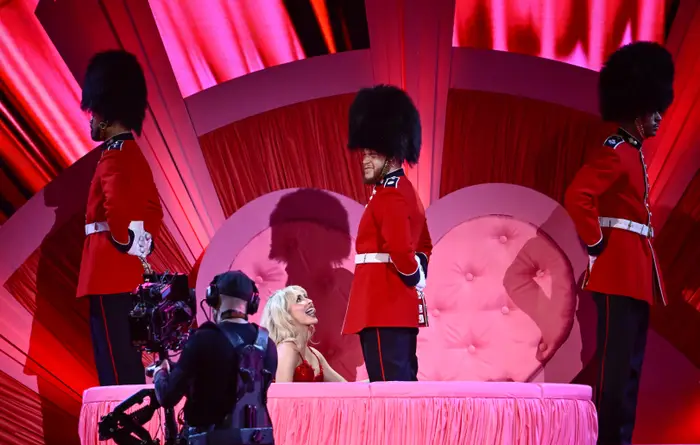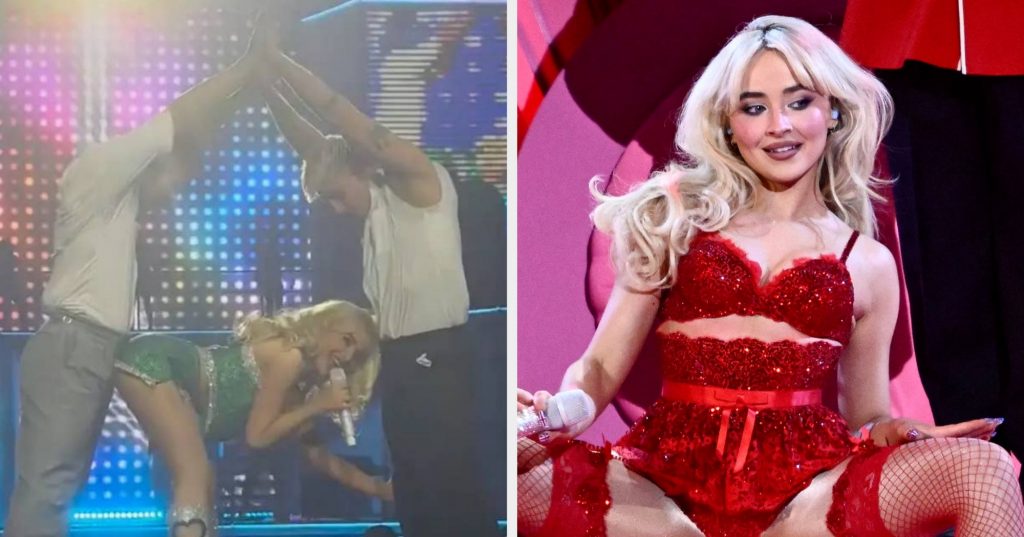Once again, Sabrina Carpenter finds herself thrust into controversy, this time for playfully demonstrating the provocative “Eiffel Tower” sex position during a recent performance in Paris. The popular singer-songwriter, well-known for her unapologetic embrace of sexuality in her music and stage shows, stirred up intense online conversations about women, sexuality, and empowerment.
It all started when Carpenter humorously performed this suggestive pose on stage with two male dancers, referencing the city’s iconic landmark. With a mischievous smile, she leaned forward between the two dancers, who dramatically joined their hands above her, replicating the structure of the Eiffel Tower. Her fans in the audience laughed, cheered, and applauded the spontaneous comedic gesture, clearly enjoying the playful reference.
Yet, as soon as the footage surfaced online, reactions became polarized. Many supporters praised Sabrina for normalizing female sexuality and treating intimacy as something fun, playful, and even empowering. They argued passionately that women should be allowed to express their sexuality freely without being judged or shamed.

However, not everyone shared this sentiment. Critics quickly emerged, declaring the Eiffel Tower position inherently problematic and degrading to women. One Twitter user ignited the heated debate by stating that the position inherently objectifies women, claiming its sole purpose is centered around men’s pleasure at the expense of the woman’s dignity.
Immediately, defenders of Sabrina Carpenter spoke out fiercely, highlighting the problematic implications of labeling consensual acts as automatically degrading. One person argued passionately that consensual intimacy, no matter the form, shouldn’t be considered shameful merely because men are involved, and that imposing such restrictive views was harmful to women’s sexual autonomy.
Others took the conversation further, cleverly flipping the narrative. “Why assume it’s the men using the woman? What if she’s the one in control?” quipped one fan, challenging conventional assumptions about gender roles within intimate acts.

Some were quick to point out that critics were perhaps missing the point altogether. After all, Sabrina Carpenter was performing in Paris—the “Eiffel Tower” position was simply a tongue-in-cheek, comedic nod to the location. Supporters emphasized that sometimes a joke is just a joke, and overanalyzing the moment takes away from its humorous and harmless intent.
One fan wrote passionately, “People love creating unnecessary drama. Sabrina clearly made a fun, obvious joke because she was literally in Paris. There was no deeper agenda here.” Another echoed these sentiments, reminding critics that Carpenter is known for her playful stage presence and comedic timing, making such performances part of her entertainment style.

Despite this, the discussion quickly evolved into broader arguments about how society views female sexuality. Many suggested the backlash against Sabrina Carpenter reflects deep-seated discomfort with women openly expressing sexual freedom. They argued passionately that women embracing their sexuality publicly shouldn’t be stigmatized or constantly analyzed under a microscope.
A fan tweeted thoughtfully, “Isn’t this reaction exactly why women often feel forced to suppress their sexuality? Why can’t Sabrina simply joke about intimacy without triggering a societal debate?”
Indeed, Carpenter has long addressed these societal attitudes in her performances and music, consciously challenging the notion that women must hide or suppress their sexuality. Her previous tours famously included humorous yet explicit improvisations, demonstrating her commitment to confronting sexual taboos openly.
When asked about her provocative lyrics in past interviews, Sabrina clarified her intention: “People misunderstand my humor; it’s not about shock value. It’s about openly embracing my sexuality without fear or shame. There’s power in reclaiming that narrative.”

Still, her recent performances, including one at the BRIT Awards, have not escaped controversy. That event drew nearly a thousand viewer complaints to the UK’s broadcast regulator due to her overtly sensual stage choreography and costume choices. Critics accused her of inappropriate behavior, whereas fans praised her fearless authenticity.

What becomes increasingly clear from these repeated controversies is the persistence of divided societal perceptions. Female artists who publicly explore sexuality continue to ignite complex discussions about gender, empowerment, autonomy, and feminism. Carpenter’s unapologetic performances seem designed specifically to push these boundaries, forcing her audience—and broader society—to confront its own discomfort.

Ultimately, Sabrina Carpenter’s latest performance has reignited these essential debates, underscoring the lingering divide between those who see women’s sexual expression as empowering and those who see it as problematic. Whether intended as provocative art or simply humorous entertainment, Carpenter’s act undeniably sparks crucial conversations around sexuality, consent, and empowerment.

Amidst the heated discussions, many remain staunchly supportive of Sabrina, appreciating her courage in challenging societal taboos. As one fan powerfully summarized, “Let Sabrina have fun, let women embrace their sexuality openly, and let’s stop policing how women express intimacy. It’s about time.”

